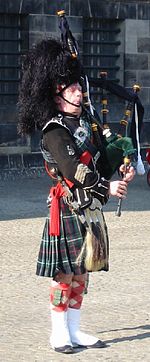User:Globaltraveller/Sandbox/Culture
Culture
[edit]
Over the course of many centuries, an amalgamation of various traditions has moulded the culture of Scotland. There is a robust arts scene, with both music and literature heavily influenced by Scottish sources and a variety of national media outlets. Several Scottish sporting traditions are unique to the British Isles & Ireland, and co-exist with more popular games such as Football and Rugby.
The Scottish music scene is a significant aspect of Scottish culture, with both traditional and modern influences. An example of a traditional Scottish instrument is the Great Highland Bagpipe, a wind instrument consisting of one or more musical pipes which are fed continuously by a reservoir of air in a bag. The Clàrsach, fiddle and accordion are also traditional Scottish instruments, the latter two heavily featured in Scottish country dance bands. Scottish emigrants took traditional Scottish music with them and it influenced early local styles such as country music in North America. Today, there are many successful Scottish bands and individual artists in varying styles.[1]
Scottish literature includes text written in English, Scottish Gaelic, Scots, French, and Latin. The poet and songwriter Robert Burns wrote in the Scots language, although much of his writing is also in English and in a "light" Scots dialect which is more accessible to a wider audience. Similarly, the writings of Sir Walter Scott and Arthur Conan Doyle were internationally successful during the late 19th and early 20th Centuries.[2] J. M. Barrie introduced the movement known as the "kailyard tradition" at the end of the 19th century, which brought elements of fantasy and folklore back into fashion.[3] This tradition has been viewed as a major stumbling block for Scottish literature, as it focused on an idealised, pastoral picture of Scottish culture.[3] Some modern novelists, such as Irvine Welsh (of Trainspotting fame), write in a distinctly Scottish English that reflects the harsher realities of contemporary life.[4]
The national broadcaster is BBC Scotland (BBC Alba in Gaelic), a constituent part of the British Broadcasting Corporation, the publicly-funded broadcaster of the United Kingdom. It runs two national television stations and the national radio stations, BBC Radio Scotland and BBC Radio nan Gaidheal amongst others. The main Scottish commercial television station is STV. National newspapers such as the Daily Record, The Herald, and The Scotsman are all produced in Scotland.[5] Important regional dailies include The Courier in Dundee in the east, and The Press and Journal serving Aberdeen and the north.[5]
Sport is an important element in Scottish culture, with the country hosting many of its own national sporting competitions, and enjoying independent representation at many international sporting events such as the FIFA World Cup, the Rugby World Cup and the Commonwealth Games (although not the Olympic Games). Scotland has its own national governing bodies, such as the Scottish Football Association (the second oldest national football association in the world)[6] and the Scottish Rugby Union. Variations of football have been played in Scotland for centuries with the earliest reference being in 1424.[7] Association football is now the national sport and the Scottish Cup is the world's oldest national trophy.[8] The Fife town of St. Andrews is known internationally as the Home of Golf[9] and to many golfers the Old Course, an ancient links course dating to before 1574, is considered to be a site of pilgrimage.[10] There are many other famous golf courses in Scotland, including Carnoustie, Gleneagles, Muirfield and Royal Troon. Other distinctive features of the national sporting culture include the Highland Games, curling and shinty. Scotland played host to the Commonwealth Games in 1970 and 1986.
- ^ "Best Scottish Band of All Time". Retrieved 2006-08-02.
- ^ Barbara Buchenau. "'Wizards of the West'? How Americans respond to Sir Walter Scott, the 'Wizard of the North'". Goettingen University. Retrieved 2006-12-11.
- ^ a b "Scottish Literature". University of Glasgow Faculty of Arts. Retrieved 2006-12-11.
- ^ "Contemporary Writers". British Council. Retrieved 2006-12-12.
- ^ a b "Newspapers and National Identity in Scotland" (PDF). IFLA University of Stirling. Retrieved 2006-12-12.
- ^ Soccer in South Asia: Empire, Nation, Diaspora. By James Mills, Paul Dimeo: Page 18 - Oldest Football Association is England's FA, then Scotland and third oldest is the Indian FA.
- ^ Gerhardt, W. "The colourful history of a fascinating game. More than 2000 Years of Football". FIFA. Retrieved August 11.
{{cite web}}: Check date values in:|accessdate=(help); Cite has empty unknown parameter:|publishyear=(help); Unknown parameter|accessyear=ignored (|access-date=suggested) (help) - ^ "Official Site of the Tennents Scottish Cup". The Tennents Scottish Cup. Retrieved 2006-12-10.
- ^ TALES from PINEHURST: Stories from the Mecca of American Golf. By Robert Hartman: Page 89.
- ^ Science and Golf IV: proceedings of the World Scientific Congress of Golf. By Eric Thain: Page 849.
